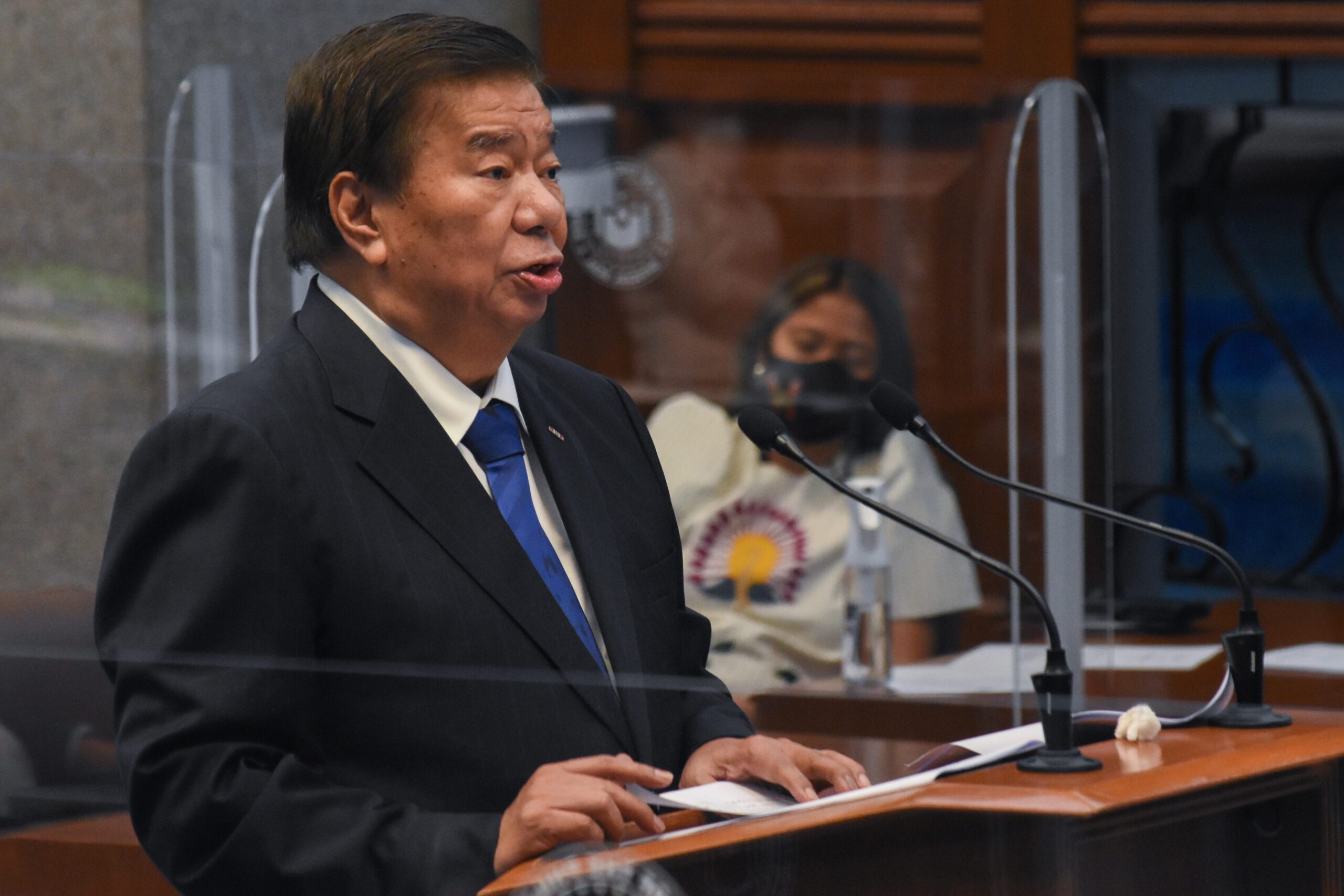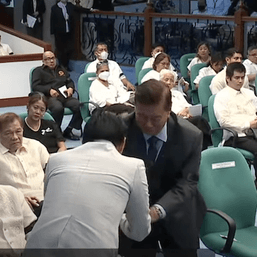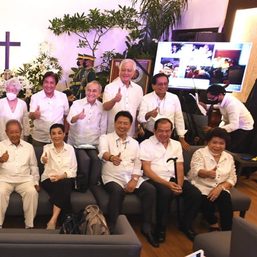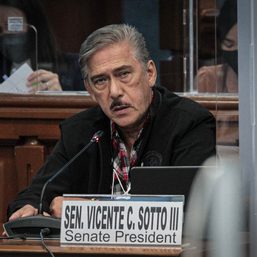SUMMARY
This is AI generated summarization, which may have errors. For context, always refer to the full article.

MANILA, Philippines – Outgoing senators – those whose two consecutive terms in office have ended and those who lost their electoral bids – delivered their “graduation” or valedictory speeches on Wednesday, June 1, the final session day of the 18th Congress.
But Senate Minority Leader Frank Drilon’s address wasn’t just a mere goodbye speech; it was also the last one that the key opposition figure would be delivering as legislator in the hallowed halls of the Senate. The 76-year-old “Big Man of the Senate,” who became Senate President four times in his 24-year career as senator, is set to retire from politics.
Below is the full text of Drilon’s speech.

Mr. President, my esteemed colleagues, ladies and gentlemen of the Senate, allow me to speak before you as a Senator of the Republic a final time.
The Senate has given me a wealth of knowledge, experience, and wisdom that I could not have gained elsewhere – not even from being a chief justice of the Supreme Court, a position which I politely declined in 2012. Much of what and who I am now I owe to the Senate. I have been Senate president four times, Senate President Pro-Tempore, Majority Leader, and Minority Leader. And it is here in the Senate where I have done my best and, perhaps, experienced my worst.
Perhaps, some will say that they will miss the position and everything that comes with being a Senator, but not the work. I, on the other hand, love the work. I take pride in doing work that matters. The legacy that I wish to leave behind is written in between the lines of the laws I have authored. And so most of you know of what I have done, the pieces of legislation that I am particularly proud of.
For more than two decades, I did my share in the passage of measures whose impact would last beyond our lifetime. Among the major laws I authored and sponsored were: the dual citizenship law or the citizenship retention and Re-acquisition Act of 2003 which grants our nationals, who have sought greener pastures abroad with the continued benefits and privileges of being a Filipino; the sin tax reform law contributes significant revenues to the government’s universal Health program, securing the welfare of indigent families and senior citizens; the GOCC Governance Act of 2011 promotes efficiency and fiscal discipline of government corporations; the amendments to the Public Service Act, Retail Trade Liberalization Act would revitalize our economy and improve services to the public through foreign direct investment, relative to which, I received a letter from the economic managers of the present administration, expressing their appreciation for our valuable contributions that led to the passage of these economic liberalization bills, including the Foreign Investment Act; the Revised Corporation Code introduced significant changes to the legal framework for the establishment and operation of corporations, ultimately facilitating the ease of doing business in the country; the Tax Incentives Management and Transparency Act or the TIMTA Law promotes fiscal accountability and transparency in granting tax incentives and served as precursor to the Create Law; the amendments to the Revised Penal Code updated the eight decade old criminal statute while the Sandiganbayan law institutionalized structural changes to this important institution of justice and accountability; and the law on synchronization of elections and term of office of ARMM officials harmonized local and national elections in compliance with the Constitution.
The laws I mentioned compose the body of work that defined my life as a legislator. But you already know that about me. The rest of what I have done is a matter of record. Today, I would like to share a bit of my story.
I am now often asked what advice I can give to new senators. There is no short or one answer. What I can say and share are some of the lessons that I learned in the 24 years that I have been in the Senate.
Early in my first term, I learned that getting elected to the Senate did not make me a senator. I had to labor hard to become worthy of the title. I had to earn my place in this house of 24 republics through hard work, late nights, and early mornings.
When I joined the Senate – back in the 10th Congress in 1995 – I was confident that my 25 years in law practice and my nine years in the executive department as labor, justice, and executive secretary have made me more than able and ready for the Senate. So I thought. While my education and work experience served me well, the Senate was tougher than I expected. I had much to learn.
To hear and see on the Senate floor an Ed Angara, Neptali Gonzales, Ernie Maceda, Blas Ople, Boy Herrera, Raul Roco, Letty Shahani – who all have gone ahead of us – as well as a Juan Ponce Enrile, Bert Romulo, Kit Tatad, and a Tito Sotto, was rather daunting. But it was also challenging and inspiring. And I knew that I must earn their respect before I can even consider myself as their equal. Respect begets respect. Respect is earned, never imposed. And there was no better way to give respect to my peers and earn theirs, than going to work each day well-prepared. No bill was too small to be examined. I always prepared and studied because of my deep respect for the Senate, my peers, and the people who have placed me here.
My dear friends, fate was relentless in surprising me with events that pushed me to make hard choices.
In the four times and the eight years and seven months that I was Senate president, I had to lead this chamber and make hard choices during its most challenging times, such as: the “I Accuse” speech in 2000 that led to the impeachment trial of then-president Joseph Estrada; the deeply divided Senate of the 12th Congress from 2001-2004, punctuated by the “rump session” in 2002 where Senate President Sotto and I were on opposing sides; the Oakwood Mutiny in 2003 that allegedly involved a then-member of the Senate and a future senator; if we had the shortest canvassing of votes for president and vice president last week, I presided over the longest canvassing in 2004, which ended a mere eight days before June 30; the “Hello Garci” controversy and the ensuing Senate investigation on wiretapped conversations in 2005; the executive-legislative stand-off brought about by EO 464 in 2005, which prompted Senate v. Ermita; and the PDAF controversy which greeted the 16th Congress in 2013.
Our duty to the people includes the great and heavy responsibility of protecting the independence and integrity of the Senate as an institution of democracy. And so even as Senate president, I welcomed, with great pain, an investigation on a project that I helped steer, not only to clear my name, but also to ensure that public trust in the institution is maintained. It was a humbling, sobering decision, which made me realize that the work we do here is much larger than ourselves.
My initiative in protecting that independence led to the Supreme Court ruling in Senate v. Ermita, that the appearance of executive officials in a legislative inquiry is mandatory if such is pursuant to the Senate’s power to conduct investigations in aid of legislation. Together with the present Senate leadership, we secured the landmark ruling in Pangilinan v. Cayetano, where the Supreme Court recognized that the power of the President in treaty abrogation is not absolute, but one that is shared with the Senate of the Philippines.
My dear colleagues, the Senate is said to be a chamber of sober second thought. With a national mandate, we are expected to think beyond the constituency of a sector or district. We legislate not only based on present expediencies or leanings, but with a recognition that these laws will outlive us all. We have to lend our efforts towards strengthening our institutions, regardless of who is at the helm. And perhaps that is what shaped my stance on certain contentious measures deliberated in this chamber. I authored and co-sponsored the Public Service Act which allows critical public services to be foreign-owned. I have also come under scrutiny for my vote on the anti-terror law. Cognizant as I was of the need to protect civil liberties, I was also aware of the challenges encountered by law enforcement, and so in good faith, I attempted to strike a balance – placing on record what the law intends to achieve, introducing amendments to protect individual rights, while ensuring that collective security will be safeguarded.
Legislation is the art of the possible. The ability to build consensus is an important skill that a leader must have, always firmly rooted in one’s values and basic principles. You lose the moment you think that the winner takes all. The ability to tolerate and see merit in views different from one’s own is valuable. This has allowed me to choose my battles well – coming up with a reasonable and principled compromise where feasible, but drawing the line when needed. It is this recognition that made me effective in my roles as Senate President, Majority Leader, and now as Minority Leader.
As a lawyer, I built my living on winning arguments. I am trained to make things difficult for my adversaries. But that is not the Minority Leader that I strived to be. I am not sure if that is how Senator Zubiri feels. Kidding aside, being part of the minority or the opposition should always be anchored on the public good, and not on the urge to obstruct or to be proven right.
There are 24 of us in the chamber. Each of us received a mandate from the people. My dear colleagues, there is great value in listening. That is why early in my career as a senator, although I was never “schooled,” I allowed myself to be taught and mentored.
To be elected into office requires highlighting one’s achievements, self-promotion if you will. But I never let that fool me into believing that public service is about me or my name.
To date, I am the only Drilon who holds an elective position in government. I am fully aware that public service is not something I can bequeath to my children or my relatives. It is both a responsibility and a privilege that is proactively chosen, out of a deep sense of duty and desire to serve, not out of entitlement or a birthright.
I never subscribed to the practice of filing bills for the sole purpose of being a prolific legislator by sheer volume of bills filed. I chose to shepherd and associate myself with measures that I believed would bring much-needed, impactful reforms. I owe my position to the people who have elected me into office. I owe it to them to produce quality bills and actually see them through.
While I am proud to have been part of the large work that has already been done for the nation, I am humbled by the knowledge that there remains so much more to be accomplished by a generation of legislators that will no longer include myself. My dear colleagues, the work of democracy is never finished. The challenge is to do better, to never be complacent, to not be disillusioned by our imperfect democracy or be attracted by the tempting notion that we have too much of it. Democracy is the reason why we stand here today, all 24 independent republics, able to speak and disagree freely, able to do the duty we have been elected to fulfill. Let us never take it for granted.
My fellow senators, I stand before you, proud and honored to have worked with you in this esteemed institution. I cannot thank you enough for your trust and confidence. I am forever grateful to the senators, past and present, for electing me Senate President four times. It was truly an honor to lead the institution in nearly nine of my 24 years as senator.
To the men and women of the Senate secretariat, thank you for your support. You have made our work easier. Your dedication and hard work are much appreciated and – I address this to the future Senate President – should be well-rewarded. One of the best decisions I ever made as Senate President was to institutionalize our employees’ monetary and non-monetary benefits.
To the Senate media, thank you for your fair coverage of our life and work in public service. Thank you for asking the tough but important questions. This afternoon, I have been presented by the media with a gift, with their well-wishes written on it. I will read a few:
- “Marami kayong natulungan. Marami kaming natutunan.” – Nimfa Ravelo of DZBB
- “Thank you for taking a stand on press freedom and for being a strong and steady figure in the opposition.” – Mara Cepeda of Rappler
Since I assumed office 27 years ago, I have been very fortunate to have hardworking men and women who stood by me, who endured long hours beside me, and who put up with my demand for excellent work. To them, my profound gratitude.
To my family, my wife Mila, my children, and my grandchildren, thank you for your love, support, patience, and understanding.
There is a time for everything. A time to work and a time to rest. After being in public life for more than 35 years, I am stepping back to my private space to spend more time for myself and with my loved ones. What used to be pockets of time carved out of my schedule for family will now be replaced by unlimited time at home. How time makes fools of us all.
My dear colleagues and friends, it is my privilege and honor to have served you and our beloved nation for most of my life. I will not say that I will be back again. I am at that stage in a man’s life where one no longer has grand dreams for himself, only memories. And you all will be in my memory. I hope that I can be in yours. Remember me fondly and kindly.
And as with many great senators before me, it is with immense gratitude and profound pride, that the gentleman from Iloilo, for the last time, yields the floor.
Thank you. God bless the Philippines. – Rappler.com
Add a comment
How does this make you feel?




There are no comments yet. Add your comment to start the conversation.